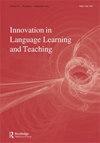词汇工具及其应用对二语词汇学习的影响——以英语学术核心词为例
IF 4.6
3区 教育学
Q1 EDUCATION & EDUCATIONAL RESEARCH
Innovation in Language Learning and Teaching
Pub Date : 2022-08-07
DOI:10.1080/17501229.2022.2102638
引用次数: 0
摘要
摘要本研究以六组74名英语学习者为样本,探讨了三种类型的词汇工具(MOOC、电子词典和词汇一致性工具)和三种类型词汇应用(基于技术的交际应用(TMCA)、Anki作为电子卡片应用和WordUp作为专用词汇应用)对学术核心词学习的影响。此外,还比较了基于导师的形式关注和基于工具的意义关注的词汇应用的有效性。在包括24次60分钟的治疗后,学生们回答了一项基于Gardner和Davies([2014].“新的学术词汇表”.应用语言学35(3):305-327)学术词汇表(AVL)中85个单词的研究测试。使用单因素方差分析和独立样本t检验的数据分析表明,词汇学习更多地通过词汇应用而非词汇工具进行。MOOC和词汇一致性大致相等,表现优于电子词典组。在词汇应用中,WordUp的效果优于TMCA和Anki Flashcard程序。与TMCA相比,安基在学术词汇学习方面取得了更多的进步。此外,以导师形式为中心的应用程序(WorUP)比以工具为中心的意义应用程序(TMCA+Anki Groups)更有效。本研究的结果表明,语言教师可以使用更多的词汇应用来提高学术核心词的知识。本文章由计算机程序翻译,如有差异,请以英文原文为准。
The effect of lexical tools and applications on L2 vocabulary learning: a case of English academic core words
ABSTRACT This study explored the effects of three types of lexical tools (MOOCs, E-dictionaries, and lexical concordancers) and three types of lexical applications (technology-mediated communication-based applications (TMCA), Anki as an e-flashcard application, and WordUp as a dedicated lexical application) on learning academic core words among a sample of 74 EFL students in six groups. Furthermore, the effectiveness of lexical applications was compared in terms of being tutor-based form-focused or tool-based meaning-focused. After the treatments that included 24 60-minute sessions, students answered a research-made test developed based on the 85 words selected from Gardner and Davies’ ([2014]. “A New Academic Vocabulary List.” Applied Linguistics 35 (3): 305–327) academic vocabulary list (AVL). Data analysis using one-way ANOVA and independent-sample t-test indicated that vocabulary learning occurred more through lexical applications than lexical tools. MOOCs and lexical concordancers roughly equal outperformed the e-dictionaries group. Among the lexical applications, WordUp attained better results than TMCA and Anki Flashcard Program. Anki showed more gains in academic vocabulary learning than TMCA. Furthermore, the tutor form-focused application (WorUP) was more effective than the tool-based meaning-focused applications (TMCA+ Anki Groups). The findings of this investigation imply that language teachers can use more lexical applications to enhance the knowledge of academic core words.
求助全文
通过发布文献求助,成功后即可免费获取论文全文。
去求助
来源期刊

Innovation in Language Learning and Teaching
LINGUISTICS-
CiteScore
6.90
自引率
6.70%
发文量
54
期刊介绍:
Innovation in Language Learning and Teaching is an international refereed journal devoted to innovative approaches to methodologies and pedagogies in language learning and teaching. It publishes research articles, review articles and book/materials reviews. It draws on a range of disciplines that share a focus on exploring new approaches to language learning and teaching from a learner-centred perspective. It will appeal to anyone interested in the development of, research into or practical application of new methodologies in language teaching and learning.
 求助内容:
求助内容: 应助结果提醒方式:
应助结果提醒方式:


